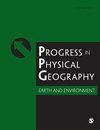河流邂逅:在光数据化中尝试 "河流的声音
IF 3.6
3区 地球科学
Q2 GEOGRAPHY, PHYSICAL
Progress in Physical Geography-Earth and Environment
Pub Date : 2024-09-03
DOI:10.1177/03091333241280543
引用次数: 0
摘要
冲积地貌学家倡导的关爱河流文化日益受到超大规模环境数据潜力的推动。有人认为,加强河流数据化有助于河流表达自己的声音,从而倡导针对特定流域的应对措施。受此启发,本文讨论了与苏格兰费希河(River Feshie)的假体研究接触,在地貌实地考察日益数字化和自动化的今天,通过光技术初步探讨 "什么是河流的声音 "这一问题。在探索费希河科学成像中的照明允许范围和过度范围时,该研究借鉴了 "批判自然地理学 "和 "女权主义新唯物主义",将河流景观的地理可视化概念化为一种局部的设想实践,而非完全的照明过程。通过强调通过不同配置的传感组合而共同产生的河流声音的多重性,该论文提倡一种批判性的河流地貌学,以质疑其关于 "真实 "的假设。本文章由计算机程序翻译,如有差异,请以英文原文为准。
Fluvial encounters: Experimenting with a ‘River’s voice’ amidst light-based datafication
Fluvial geomorphologists’ advocacy for a culture of care towards rivers is increasingly animated by the potentialities of hyperscale environmental data. Championing catchment-specific responses, it has been argued that intensified datafication of rivers can help them express their own voice. Motivated by this provocation, this paper discusses prosthetic research encounters with the River Feshie in Scotland to tentatively approach the question ‘what is a river’s voice’ in a moment of increasing digitisation and automation of geomorphological fieldwork via technologies of light. Exploring the allowances and excesses of illumination in the scientific imaging of the Feshie, it draws on ‘critical physical geography’ and ‘feminist new materialism’ to conceptualise the geovisualisation of riverscapes as a partial practice of envisioning, rather than a process of total illumination. By highlighting the multiplicity of riverine voices that become co-produced through differently configured sensing ensembles, the paper advocates for a critical fluvial geomorphology that interrogates its assumptions about access to the ‘real’.
求助全文
通过发布文献求助,成功后即可免费获取论文全文。
去求助
来源期刊
CiteScore
7.20
自引率
5.10%
发文量
53
审稿时长
>12 weeks
期刊介绍:
Progress in Physical Geography is a peer-reviewed, international journal, encompassing an interdisciplinary approach incorporating the latest developments and debates within Physical Geography and interrelated fields across the Earth, Biological and Ecological System Sciences.

 求助内容:
求助内容: 应助结果提醒方式:
应助结果提醒方式:


